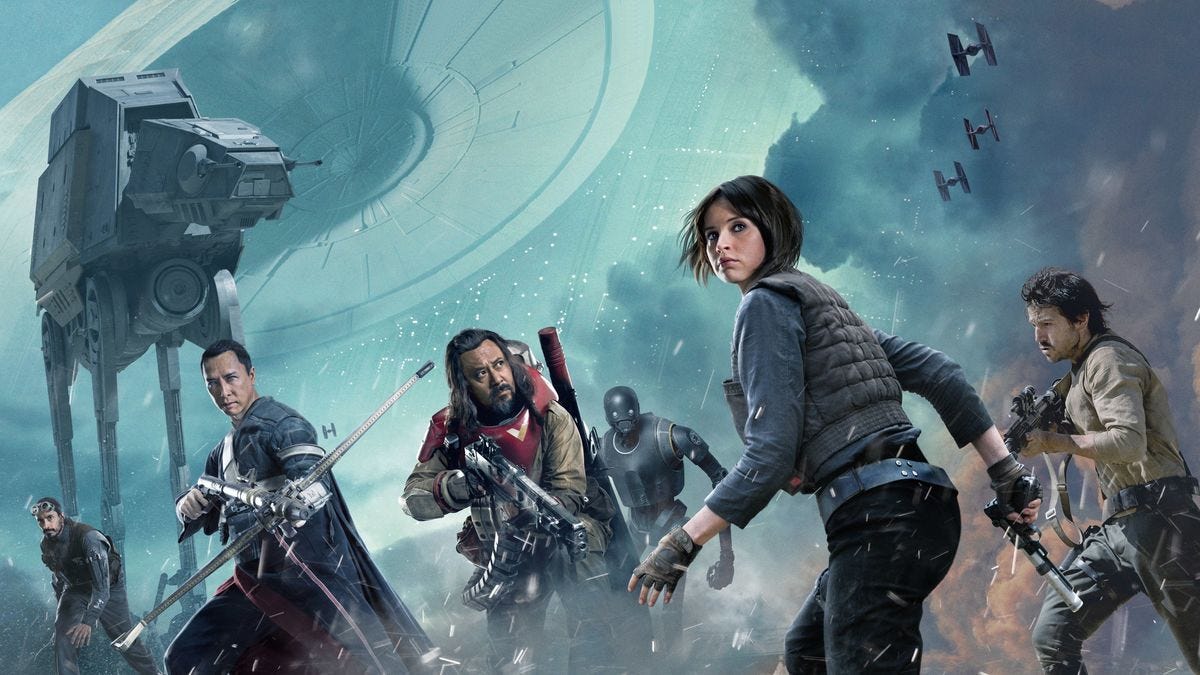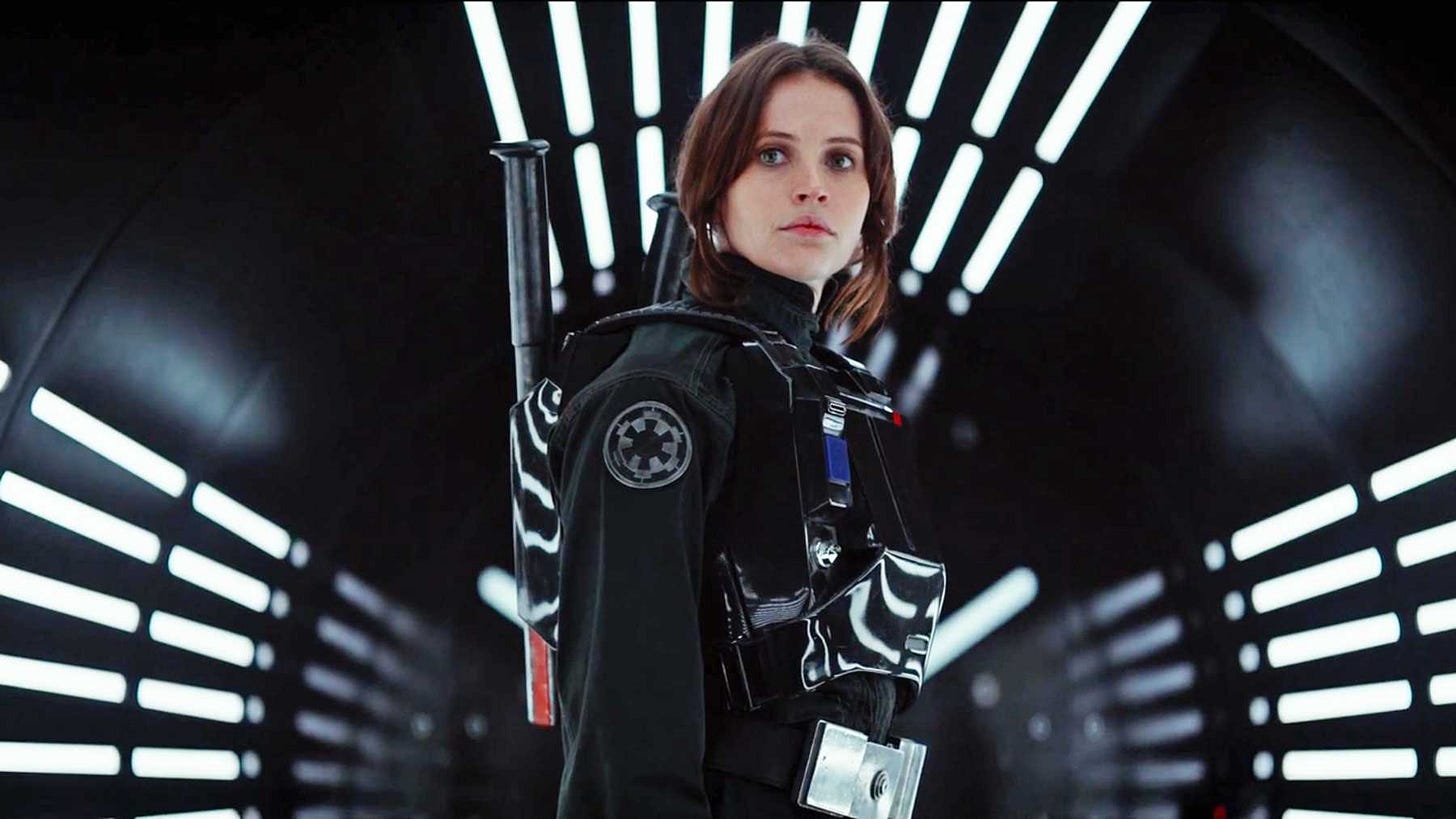Three Years Since Rogue One: A Star Wars Story
It's another look from me at this very small film series you might not have heard of.

What does a film have to do to be considered a Star Wars movie?
Is it simply about being an official product? Disney owns the IP now, so if they say something is Star Wars, does that make it so? It’s a thought too depressing for me to buy into. Ultimately it’s us, the audience, who get to decide what “counts”. Fans of Dune seem to have decided that the official novels written after Frank Herbert’s death are not sufficiently canon to pay attention to. Warner Bros. went as far as hiring J.K. Rowling to write the Fantastic Beasts film series, but no one seems to much care about their radical revisionism of the Harry Potter canon. They may as well not exist. That a segment of the audience gets so angry about the Disney era Star Wars movies suggest that they still retain that magical quality of mattering so that they cannot be dismissed out of hand.
The Force Awakens went to great length to show that it was “real” Star Wars, moreso than even the prequels. If Harrison Ford and Peter Mayhew are standing on the Millennium Falcon set, speaking lines written by Lawrence Kasdan, then it’s hard to deny its bona fides, even without George Lucas. But what was most important was that it felt like Star Wars, that it felt seamless with the films that already existed. You might have loved The Force Awakens, but it did more than enough to earn that sense of authenticity. That’s what it was built to do, and it achieved it.

But Rogue One then had a much harder task. It wants to fit the definition of real Star Wars, yes, but at the same time attempt to expand what can fit in that box. It must have felt like they were really playing with something interesting in the development stage. It’s the chance to take the setting and iconography of Star Wars, but put it in a completely different genre without most of the franchise’s normal rules. It could fundamentally rewrite what this property is and can be, making way for a new wave of films unburdened by strict expectations.
Of course, on this front, it failed. Disney blinked during production. A wave of reshoots were done to Star Wars it up a little. Director Gareth Edwards took a backseat as Tony Gilroy took over his movie. Alexandre Desplat was working on a score that may have totally broken with John Williams’ canon, giving this world a wholly different sound, but he was replaced by Michael Giacchino at the last minute to put in the kind of poor man’s Williams work that Mr. Cutesy Track Title Pun is famous for. Felicity Jones’ protagonist Jyn Erso, seemingly hard-as-nails in the early trailers, was softened a touch to be “more like Rey”. A cool looking scene where Darth Vader kills a bunch of people was thrown in because hey, that’s what the people want to see. To quote Krusty the Klown: this ain’t art, it’s business. If people expect certain things from a Star Wars product, we better make damn sure we deliver it to them.
And that’s a great shame. Fortunately, they didn’t strip out its uniqueness completely. Edwards can be a cold filmmaker at times, more interested in things and story constructions and visuals than character, but he certainly brings a certain verve to the way this thing looks. It’s a testament to the power of blocking and cinematography that Rogue One is able to take such familiar iconography and make it look different. It at times feels like action direction at blockbuster level is a forgotten craft (thanks a lot, Kevin Feige), but Rogue One really does do distinctive work here.
As much as anything, it’s a movie that attempts to drop a different genre template into Star Wars. Vox critic at large and, much more importantly, friend of the newsletter Emily VanDerWerff observed at the time that it was “the first Star Wars movie to acknowledge the whole franchise is about war”, which got some pushback from a lot of astonishingly dim people who seemed to believe that these are true war movies just because they have “Wars” in the title. But it really does get at how the film is trying to stand out in this franchise. She describes it pretty succinctly here:
“The unifying theme of Rogue One is simple: People die in wars. If the Star Wars saga is about a war between freedom and tyranny, then a lot of people are going to die fighting that war. Those on the side of good are going to make questionable decisions. Those on the side of evil are sometimes just doing their jobs but will get their lives snuffed out anyway.
Edwards emphasizes this inevitable death throughout. When two starships collide, he’ll intercuts shots of the people inside those starships, toppling over, never having realized that this particular day was the day they would die.”
If the main Star Wars episodes, or what they’re now calling the “Skywalker Saga”, are a mythic adventure story about the classic “hero’s journeys” of the protagonists, Rogue One is the story behind the story. Anakin or Luke or Rey might get to have a wonderful arc of saving the galaxy and redeeming themselves, but that’s not how wars work. If you’re out there in the trenches, it’s going to look pretty ugly. For all that the other movies feint towards pacifism, this is the one that at least tries to point towards what actually happens at war. Don’t get me wrong, we’re talking degrees of difference here. It’s still a big, exciting blockbuster. And the weight of Disney is trying to conform it to the mould. But it still manages to find some interesting ways to do it differently.
Arguably the “cheat” it employs is to use a plot and setting that sticks so close to the original Star Wars. It is, quite literally, about the bits that happen right before the Star Destroyer flew across the screen in 1977. If you’re going to play around with some other elements, it’s understandable that they’d play it ultra safe here. There’s something familiar about seeing the Death Star fly over. It often feels like the trick of blockbuster filmmaking is to mix up enough familiar elements with something that feels new. Look at Joker tearing up the box office with a very famous character and setting, but from a different (and bad, but that’s a story for another day) perspective. Even if it’s just riffing on Martin Scorsese movies, it’s still a recipe we hadn’t had before. Rogue One is the same deal.
I know there are a lot of people out there who don’t like this movie. And I get it. It’s broken in many ways. It can’t really find the emotional core of the characters’ journeys. It’s kind of sloppily put together from different cuts and reshoots. It’s an imperfect product. But in a way, I like that it’s rough around the edges. This is a rough around the edges kind of movie, showing a rougher side to the franchise. As a film, it’s pretty good. As an experiment for what Star Wars could be going forward, it’s a fascinating work. It looks like Lucasfilm are going to play it more safe going forward, but I really wish they’d go back to making the kind of varied movies that Rogue One offered a glimpse of.

